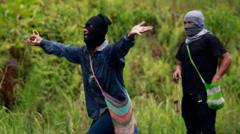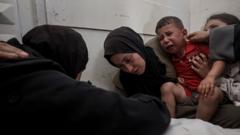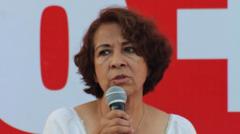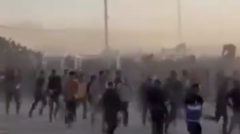Shatha al-Sabbagh, a 21-year-old journalism student, was fatally shot during a chaotic incident attributed to the Palestinian Authority's security forces amidst a crackdown on armed groups in Jenin. Her family's mourning reflects broader frustrations with the PA's violence, drawing attention to the complex power dynamics in the region and the impact on civilians.
The Tragic Death of Shatha al-Sabbagh and the Ongoing Power Struggles in the West Bank

The Tragic Death of Shatha al-Sabbagh and the Ongoing Power Struggles in the West Bank
The shooting death of journalism student Shatha al-Sabbagh has highlighted ongoing tensions between the Palestinian Authority and armed groups in Jenin, eliciting a national outcry for justice and safety.
Amid escalating tensions in the West Bank, a tragic incident has drawn attention to the ongoing struggles between the Palestinian Authority (PA) and armed factions, as well as the repercussions for civilians caught in the crossfire. The death of Shatha al-Sabbagh, a 21-year-old journalism student, has sparked national outrage and layered debates about accountability in the region.
On New Year's Eve, Shatha was out with her mother and young family members in Jenin, purchasing chocolate when gunfire erupted, ultimately ending her life. Her mother, Umm al-Motassem, described heart-wrenching details of the moment Shatha was shot, recalling, "I started screaming, 'Stop shooting! My daughter is dead. My daughter is dead.'" The family unequivocally holds the PA responsible for her death, citing the heavy PA security presence in their neighborhood. The PA, however, has deflected blame onto “outlaws,” referring to armed groups like the Jenin Battalion—comprised of factions such as Hamas and Palestinian Islamic Jihad (PIJ)—who are engaged in a deadly clash with PA forces.
The PA initiated a significant security operation targeting these armed factions, viewing them as a growing threat to their authority. Tension has been palpable in Jenin, a region rife with armed clashes, civilian casualties, and disrupted daily life. As the PA continues its crackdown, at least 14 individuals have died, including minors—furthering local fears of the PA as much as the Israeli military presence.
Critics of the PA argue that their measures reflect growing unpopularity, primarily tied to security cooperation with Israel and a rejection of armed resistance. Mustafa Barghouti, a political figure, suggests the rift between Fatah and Hamas exemplifies the Palestinians’ deeper challenges as they contend with Israeli military action and internal strife.
Palestinians in Jenin describe debilitating conditions exacerbated by the PA's continuous actions—cut-off utilities, limited movement, and a climate of fear, as they liken the PA's operations to a form of collective punishment. Sadaf, a local resident, articulated the pervasive anxiety, stating, "When we go out, we say our final prayers."
The UN has expressed concerns regarding potential human rights violations stemming from the PA’s response to internal dissent, and residents have demanded accountability for Shatha’s death. Umm al-Motassem's painful plea for justice underscores a collective sorrow and yearning for peace in a region plagued by conflict: "Justice will be served when I know who killed my daughter."
As the political landscape continues to evolve, tensions are expected to remain high, with the PA aiming to demonstrate control amid external pressures. However, voices from Jenin reiterate a poignant truth—their need for safety and the resolution of violence remains urgent and unresolved amidst an ongoing struggle for power and identity in Palestine.





















